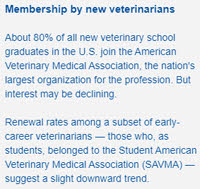
Membership by new veterinarians
A shrinking proportion of veterinarians belong to the American Veterinary Medical Association, even as total membership in the professional group has reached a record high of 96,500.
There may be multiple reasons for the trend, but one important factor is that a significant share, about two out of 10, of new veterinary school graduates don't join, possibly because they're unwilling to pay the full annual dues of $360.
To address the problem, 10 state veterinary medical associations are proposing that the AVMA House of Delegates alter the association's dues structure such that newer graduates receive a break on the cost of membership. Among the arguments proponents make is that recent graduates are "often burdened with substantial student loan debt." New veterinarians who relied on loans to pay for their education amass an average $183,000 of student loan debt, according to figures from the AVMA.
The House will consider the dues proposal among other business when it meets for the policymaking body's winter session on Friday and Saturday. Held in conjunction with the AVMA Veterinary Leadership Conference, the meeting typically convenes in Chicago but because of the COVID-19 pandemic, the gathering will take place virtually.
The AVMA's problem of declining market share isn't new. Former AVMA CEO Dr. Ron DeHaven reflected on it in 2015, when membership was at a then-all-time high but the share of U.S. veterinarians belonging to the group had slid to 80%. In earlier years, 85% was more typical.
Today, the group counts 74% of all U.S. veterinarians as members.
"What's happening is that they're losing market share year after year after year," said Dr. Richard Panzero, a practice owner in Tucson, Arizona, and a delegate to the AVMA representing his state. "A reason behind that is the lack of renewal or retention of recent graduates."
Panzero, whose state veterinary medical association is one of the 10 calling for restructuring of dues, noted that generating interest in membership among new veterinarians is important to the organization's relevance, not to mention essential to keeping the national association afloat: Funding of nearly three-quarters of the group's annual budget comes from dues.
But much already is done to make membership dues affordable, AVMA officials contend. Right now, all new veterinarians receive free AVMA membership for the balance of their graduation year and get half off dues ($180) the next time they renew. Members of the Student American Veterinary Medical Association in good standing at the time of graduation also can get half off a second consecutive year of AVMA membership.
The resolution to alter the dues structure calls for charging new graduates $90 for the first full year of membership, $180 for the second year and $285 for the third year — discounts that reduce AVMA revenue by $520,000 on an annual basis, assuming there's no improvement in retention or renewal.
To offset a half-million-dollar hit to the AVMA's budget, Panzero suggests the association turn to the more than $40 million it has saved in reserves, generated by investments.
In background provided to House delegates, the AVMA Board of Directors responded that "pulling monies from the reserves is not something the AVMA takes lightly."
Currently, about 80% of new veterinarians renew their membership with the AVMA after their first free partial year. Employers pay the dues of roughly 60% of them; another 10% get percent get partial compensation or a stipend for AVMA dues from their employers. That means 70% of newer graduates get some form of support for dues expenses.
Panzero says that leaves plenty of recent graduates who might appreciate deeper discounts on AVMA dues — and attract those who don't join. Once they have four or five years in, veterinarians typically keep their AVMA memberships for life, he said.
Letters

AVMA board members say they're "fully committed" to working with the House on providing more benefits to students. However, the organization's leaders did not plan for a potential half-million-dollar shortfall when drawing up the $44 million budget for 2021, nor is a revised dues structure a part of the association's long-term strategic plan.
"Student debt is a complex issue" that's unlikely to be substantively reduced by a modest dues reduction, the background document reads. The AVMA states that marketing research completed in 2020 shows that programs — not reduced dues — engage new veterinarians and bond them to the national association. Since 2017, the AVMA has developed initiatives targeting the primary concerns of recent graduates: career development, financial health and personal well-being.
For these reasons, the board recommends tabling the resolution for further study.
Panzero doesn't want to see that happen.
"We feel that we need BOTH a reduction in dues along with robust programs geared towards recent graduates to improve this trend," he said by email. "We are fortunate that the AVMA is in a financial situation where we can accomplish both."
Resolution to ban ventilation shutdown
A resolution brought by an AVMA-member petition calls on the national organization to reclassify ventilation shutdown (VSD) as "not recommended" for culling large populations of poultry and pigs.
The practice of shutting down air flow and turning up heat to euthanize animals en masse currently is approved under crisis conditions in the AVMA depopulation guidelines.
Producers in Iowa used VSD last spring to cull herds of healthy pigs in an effort to alleviate overcrowding caused by pandemic-related slowdowns at slaughterhouses. Animal rights activists surreptitiously recorded as ventilation fans were turned off and hot air was pumped into swine housing facilities, causing thousands of deaths related to hyperthermia.
With the video footage circulating the internet, the topic of using VSD — as opposed to other depopulation techniques, such as captive bolt or gunshot — raised polarizing debate among veterinarians. The AVMA became the target of public and professional scrutiny over its inclusion of VSD, along with heat, as a means for mass-exterminating animals in emergencies.
While the AVMA isn’t a regulatory body and has no authority over depopulation decisions by producers or state and federal agencies, the organization is influential and has long studied when and how best to humanely euthanize large numbers of animals when necessary. In its 2019 guidelines, the AVMA deems VSD acceptable for depopulating as a "last resort," when "all other options have been thoughtfully considered and ruled out."
The resolution to change the AVMA's position to "not recommended" came up late — after the AVMA deadline of early October. As such, for the proposal to be considered this week by the House, two-thirds of delegates must agree to waive the prior-notice provision.
New campaign rules
House delegates will consider updated rules for AVMA officer election campaigns that are designed to give all candidates an equal chance to succeed when running for association offices.
The request stems from a resolution delegates approved in summer 2019, which asked AVMA officials to appoint a working group to review election processes. In the past, those who've been elected to one influential body within the AVMA might hold events, using the face time with colleagues to campaign for seats elsewhere in the organization.
If the resolution passes, such activities might not be allowed. The working group rewrote the election rules to change elements involving eligibility; campaigns; travel expenses; funding; influence and endorsements; and violations. Also included are new guidelines on the use of social media, which call for an "adherence to professional ethical behavior."
The less-prescriptive current election rules for officer candidates are limited to eligibility, campaign scheduling, travel expenses and violations.
Policy revisions
Delegates will consider a handful of other resolutions to alter AVMA policies and redraft guidelines, as follows:
- A revised policy on veterinary dentistry addresses concerns regarding the role of technicians and retains language to protect the scope of practice against the encroachment of lay equine dentists who float the teeth of horses.
- Draft guidelines concerning the AVMA's policy on exempt biologics whittle down information that provides practical instruction, since it's already familiar to livestock producers that use such products, and advises veterinarians to contact the U.S. Department of Agriculture when considering preparations.
- Draft policy advocating for "necessary veterinary medical therapy" addresses concerns that practitioners might be expected to withhold antimicrobials or other medications from sick patients due to government and industry guidelines that encourage restricted use.
COVID-19 aftermath, spay/neuter conventions
Delegates have set aside time during the meeting to discuss high-profile issues significant to AVMA members. Forum topics include the impact of COVID-19 on the profession and evolving professional consensus on when to spay and neuter dogs.
Research suggests that the pediatric desexing of dogs of certain breeds is linked to orthopedic problems, some cancers and obesity, among other disorders. Such findings challenge decades of evolving professional consensus to neuter dogs early, at six months of age or sometimes younger.
An AVMA guide on the topic reflects evolving thought on desexing, weighing the benefits of spaying and neutering against factors such as age, breed and risks. No single recommendation is appropriate for all dogs, the document states.
"Developing recommendations for an informed case-by-case assessment requires an evaluation of the risks and benefits of spay/neuter, including its potential effects on neoplasia, orthopedic disease, reproductive disease, behavior, longevity, and population management," the AVMA says. "However, many factors other than neuter status play an important role in these outcomes, including breed, sex, genetics, lifestyle, and body condition."
Update: For the first time in its history, the House of Delegates rejected a late-submitted resolution; the group declined to consider altering its stance on ventilation shutdown. Two other agenda items — a bid to cut dues for recent graduates and a resolution to amend campaign rules — were referred for further review by AVMA officials and/or committees. Delegates adopted all other resolutions.